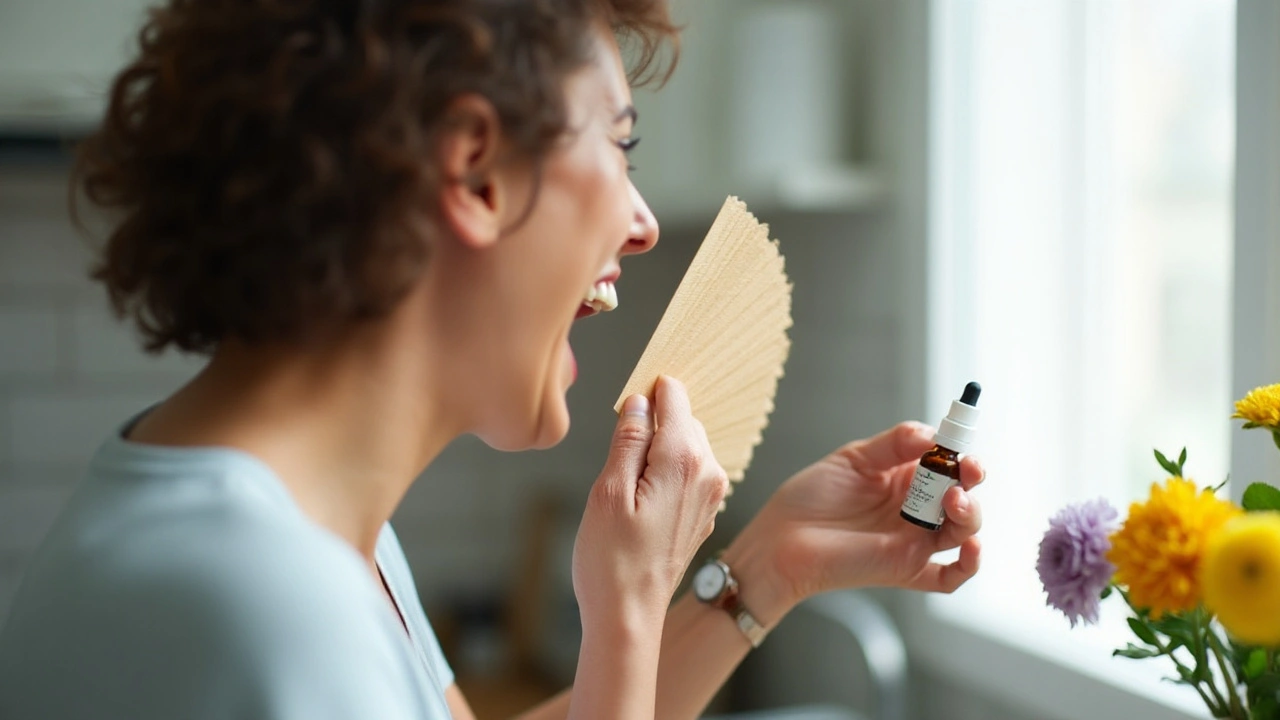Menopause is a natural phase in a woman's life that usually begins in their forties or fifties. It brings about significant hormonal changes that can lead to various symptoms, ranging from hot flashes and mood swings to insomnia and fatigue.
Many women are turning to homeopathy as a way to relieve these symptoms naturally. Homeopathy is a holistic approach that uses highly diluted substances to trigger the body's natural healing processes.
- Understanding Menopause and Its Symptoms
- What is Homeopathy?
- Homeopathic Remedies for Menopause Symptoms
- How to Choose and Use Homeopathic Remedies
- Lifestyle Tips for Managing Menopause Naturally
Understanding Menopause and Its Symptoms
Menopause is a phase that every woman experiences, usually in her late forties to early fifties. It's marked by the end of menstrual cycles and is a natural biological process. Menopause officially starts when a woman hasn't had a menstrual period for twelve consecutive months. This transition can lead to a variety of symptoms, thanks to changes in hormone levels, primarily estrogen and progesterone.
One of the most common symptoms is hot flashes. These sudden feelings of heat, which often appear as sweating and a flushed face, can last from a few seconds to several minutes. They can occur at any time, causing discomfort and disrupting daily activities. Hot flashes affect about 75% of women going through menopause.
Another frequent symptom is mood swings. These emotional ups and downs can be challenging to handle. They are often due to fluctuating hormone levels. Women might feel irritable, anxious, or even depressed. Such emotional changes can be stressful, impacting both personal and professional relationships.
Insomnia is also a typical symptom of menopause. Hormonal changes can make it difficult for women to fall or stay asleep, leaving them feeling tired and sluggish during the day. This lack of sleep can exacerbate other symptoms like irritability and fatigue, creating a frustrating cycle that's hard to break.
Menopause can also bring about changes in skin texture and hair thinning. Reduced estrogen levels can make the skin less elastic and drier, and some women may notice their hair becoming thinner or more brittle. While these changes are a normal part of aging, they can still be distressing.
One often overlooked symptom is vaginal dryness. This can make sexual intercourse uncomfortable or even painful, leading to a decrease in sexual desire. Vaginal dryness affects up to 50% of women and can significantly impact quality of life.
According to the National Institute on Aging, "Menopause is a normal part of aging, but its symptoms can be disruptive. It's important for women to know that help is available."
Other possible symptoms include night sweats, weight gain, and a decline in bone density. Night sweats are essentially severe hot flashes occurring during sleep, while weight gain can result from slower metabolism. Declining bone density increases the risk of osteoporosis, making it crucial for women to monitor their bone health.
It's worth mentioning that these symptoms vary widely. Some women might breeze through menopause with few problems, while others could find it quite challenging. No two experiences are the same, reinforcing the importance of personalized treatment options, like homeopathy, to address individual needs.
What is Homeopathy?
At the heart of homeopathy is a very simple principle: like cures like. This idea suggests that a substance causing symptoms in a healthy person could treat similar symptoms in someone who is unwell. Developed over 200 years ago by a German doctor named Samuel Hahnemann, homeopathy has become a popular form of alternative medicine all around the world.
When it comes to treating menopause symptoms, homeopathy offers individualized remedies that are tailored to a woman's specific symptoms and constitution. These remedies are derived from natural sources like plants, minerals, and even animal products. The substances are highly diluted, making them safe to use but still effective in triggering the body's natural healing processes. For example, a remedy like Sepia, made from cuttlefish ink, is often used for hot flashes, night sweats, and mood swings associated with menopause.
An exciting aspect of homeopathy is its holistic nature. It doesn't just treat isolated symptoms but looks at the person as a whole. This means that a homeopath will consider your emotional and mental state, as well as your physical symptoms, when prescribing a remedy. By addressing the root cause of symptoms, rather than just masking them, homeopathy aims to restore balance and wellbeing.
In recent years, there's been a growing body of research supporting the efficacy of homeopathic treatments. A study published in the journal 'Menopause' found that women who used homeopathic remedies experienced significant relief from hot flashes and mood swings compared to those who used a placebo.
"Homeopathy is a gentle way to support the natural processes of the body, especially during menopause," says Dr. Jane Norris, a well-respected physician specializing in integrative medicine.If you're curious about trying homeopathy, it's important to consult with a qualified homeopath to find the right remedies for you.
While homeopathy can be incredibly effective, it works best as part of a broader approach to health and wellbeing. Combining homeopathic treatments with a healthy diet, regular exercise, and other natural remedies can provide even greater relief from menopause symptoms.
It's also crucial to be patient when using homeopathic remedies. Because they are very gentle, it can take some time to see the full effects. However, many women find that the wait is worth it, as the benefits of homeopathy are long-lasting and side-effect free.

Homeopathic Remedies for Menopause Symptoms
Homeopathy has gained traction as a preferred choice among women trying to navigate the rough waters of menopause. Each woman experiences menopause differently, but common symptoms such as hot flashes, mood swings, and insomnia are often universal. Thankfully, homeopathy offers a varied palette of treatments to help alleviate these discomforts.
One of the most commonly used remedies is Lachesis, which is particularly effective for managing hot flashes. This homeopathic medicine is made from the venom of the bushmaster snake and is known for its ability to help with symptoms that worsen during sleep or during the morning. If you often feel like your symptoms are alleviated by fresh air, Lachesis might be the remedy for you.
“Homeopathy is highly individualized, so it's important to work with a practitioner who can tailor the remedies to your specific symptoms. This personalized approach can make a big difference,” says Dr. Anisa Kassim, a well-known homeopathic practitioner.
Another useful remedy is Sepia, derived from the ink of the cuttlefish. It's particularly effective for women who experience significant irritability and fatigue. Women who benefit from this remedy often feel a strong aversion to their loved ones and have a relentless sense of wearing down by daily responsibilities. If this sounds familiar, Sepia might be worth considering.
Pulsatilla is another potent remedy, well-suited for women who feel emotionally fragile and tend to weep easily. Derived from the windflower, it’s particularly effective for those who see changes in their moods with the weather or time of day. If your symptoms seem to fluctuate unpredictably, Pulsatilla could provide some much-needed relief.
For those struggling with insomnia, Pulsatilla is another go-to remedy. It's known for addressing restlessness and an overactive mind, which can prevent a good night's sleep. Incorporating this into your routine could pave the way for a more restful slumber, something every menopausal woman craves.
How to Choose and Use Homeopathic Remedies
When it comes to choosing the right homeopathic remedy, it’s crucial you pay close attention to the specific symptoms you’re experiencing. Consulting a qualified homeopath can be extremely beneficial. These professionals can guide you towards the most effective remedy by understanding the nuances of your symptoms.
The dosage and frequency of the remedies can vary, but many homeopathic treatments are available in the form of tiny pellets that dissolve under the tongue. Generally, it is advised to follow the 'less is more' philosophy. Homeopathy believes in minimal doses to trigger the body's healing response. Always consult a homeopathic expert before beginning any new remedies, particularly if you are already on other forms of medication.
Practical Tips for Incorporating Homeopathy
Starting with homeopathic remedies can feel daunting, but it's simpler than it appears. Here are some practical tips to help you incorporate these natural treatments into your routine:
- Keep a symptom diary: Documenting your symptoms can help pinpoint which remedies might work best for you. Note down the time, duration, and intensity of your symptoms.
- Stay hydrated: Water is a crucial component of homeopathic treatment. It's believed that staying well-hydrated can aid the effectiveness of the remedies.
- Be patient: Homeopathy works gradually and might take some time to show noticeable benefits. Don't be disheartened if you don't experience immediate relief.
- Follow the guidelines: Always follow the recommended dosage and avoid touching the pellets with your hands, as this can transfer oils and diminish their effectiveness.
- Consult regularly: Keep in touch with your homeopathic practitioner. Regular consultations can help tweak your treatment plan as your symptoms evolve.
How to Choose and Use Homeopathic Remedies
Choosing the right homeopathic remedy for menopause can sometimes feel a bit overwhelming, especially with the plethora of options available. However, with a few guidelines, you can find the remedy that best suits your needs. Start by identifying your most bothersome symptoms. For instance, if you are primarily struggling with hot flashes, remedies such as Lachesis and Sulphur might be quite helpful.
To pinpoint the best remedy for your symptoms, consider the timing, triggers, and patterns of your discomfort. Homeopathic remedies are known for their specificity. Lachesis, for example, works wonders for those who experience intense hot flashes that are aggravated by heat and tight clothing. Sulphur, on the other hand, is suitable if you have night sweats and tend to feel overheated even in cooler conditions.
Consult a Qualified Homeopath
If you are new to homeopathy, consulting a qualified homeopath could be beneficial. A skilled homeopath can take a detailed history and understand your unique symptom picture. They can tailor a remedy specifically to your needs and provide dosages that align with homeopathic principles. It's worth mentioning that homeopaths not only consider physical symptoms but also emotional and mental states.
According to the British Homeopathic Association, "Homeopathy offers women a natural alternative to managing their menopause symptoms, emphasizing individualized care and minimal side effects."
Once the remedy is selected, proper usage is crucial. Most homeopathic treatments come in small pellet forms, typically taken under the tongue. It's generally recommended to take these remedies away from meals, coffee, or strong flavors to avoid interference with their efficacy. The frequency of doses can vary, so follow the guidelines provided by your homeopath or the instructions on the product packaging.
Keeping Track and Adjusting
Monitoring your symptoms after starting a homeopathic remedy is essential. Keeping a journal can help you track your progress and notice any changes, both positive and negative. As your body begins to respond, the frequency or potency of the remedy might need adjustment. Always consult your homeopath before making any changes to your dosage.
Remember, homeopathy aims at holistic healing and can work harmoniously with lifestyle changes. Incorporating healthy habits like regular exercise, balanced diet, and stress management techniques can complement the effectiveness of your remedy. Every woman's experience with menopause is distinct, and finding the right remedy is often a process of trial and error, but with patience and persistence, relief is achievable.

Lifestyle Tips for Managing Menopause Naturally
Embarking on the journey through menopause can feel like navigating uncharted territory, but adopting certain lifestyle changes can make the ride smoother. Diet plays a significant role in managing menopausal symptoms naturally. Intentionally incorporating a variety of fruits, vegetables, and whole grains into your meals can help balance hormones and provide much-needed nutrients. Foods rich in phytoestrogens, such as soy products, flaxseeds, and lentils, can mimic estrogen in the body and help manage hormone levels effectively.
Exercise is another essential component in managing menopause symptoms. Regular physical activity can combat weight gain, improve sleep, and ease stress. Activities like yoga and tai chi are particularly beneficial as they combine relaxation and flexibility, reducing anxiety and promoting mental well-being. Engaging in these practices several times a week can improve your quality of life dramatically. Dr. Sarah Brewer, a nutritionist and health expert, says,
"Exercise is one of the most powerful tools women can use to reduce the impact of menopausal symptoms."
Stress management cannot be overlooked when discussing menopause. Techniques such as deep breathing exercises, meditation, and mindfulness can alleviate stress and have a positive impact on your overall well-being. Even spending a few minutes each day practicing deep breathing or using apps designed for mindfulness can produce noticeable benefits. It’s worth noting that limiting caffeine and alcohol, which can exacerbate symptoms like hot flashes and sleep disturbances, can also be very effective.
Proper hydration is key to managing menopause symptoms naturally. Drinking sufficient water helps maintain skin elasticity, reduces bloating, and combats the dryness commonly experienced during menopause. Aim for at least eight glasses of water a day. Another helpful tip is to keep a water bottle handy to remind you to stay hydrated throughout the day.
Sleep hygiene is critical during menopause, as hormonal changes can disrupt your sleep patterns. Create an environment conducive to sleep by keeping your bedroom cool and dark, and establish a calming bedtime routine. Limiting screen time before bed can make a huge difference as well, as the blue light emitted by screens can interfere with sleep hormones.
It’s also important to seek support from others going through similar experiences. Connecting with a support group can provide emotional relief and practical tips for navigating menopause. Whether online or in person, sharing experiences can boost your mental health and provide a sense of community.
Lastly, consider integrating complementary therapies like acupuncture or herbal supplements under the guidance of a healthcare professional. These methods can provide relief from symptoms and improve your overall quality of life. Always consult with your doctor before starting any new treatment to ensure it is safe and appropriate for your individual health needs.
Incorporating these lifestyle tips into your daily routine can make menopause more manageable and help you embrace this new chapter of life with confidence and grace.


Earl Hutchins
September 20, 2024 AT 21:10Menopause unfolds like a sunrise, painting the body with hues of change. The heat of hot flashes drifts across the skin like a fleeting comet. Homeopathy steps in as a gentle breeze, coaxing the inner thermostat to settle. Remedies such as Sepia and Lachesis are crafted from nature’s own palette. These dilutions whisper to the cells, encouraging them to remember their balance. By honoring the emotional tides, the mind finds calmer waters. A symptom diary becomes a compass, guiding the practitioner toward the right potencies. Patience is the quiet gardener who waters the seeds of recovery. Over weeks, many women report a softening of night sweats. Mood swings can smooth into more predictable rhythms. Sleep, once a distant star, often returns with gentle regularity. The holistic view reminds us that the body is a symphony, not a solo instrument. Integrating gentle exercise amplifies the homeopathic melody. Hydration acts as a clear stage for the remedies to perform. In the end, embracing this natural pathway can transform menopause into a graceful transition.
Tony Bayard
September 27, 2024 AT 17:45What a vivid tapestry you have woven around this delicate phase! I can almost hear the echo of each remedy dancing in the bloodstream. The synergy between mind and medicine truly shines here. Readers will feel the surge of hope as they explore these options.
Jay Crowley
October 4, 2024 AT 14:19Sounds like solid advice.
sharon rider
October 11, 2024 AT 10:53The cultural lens through which menopause is viewed invites deeper reflection. Each woman's journey becomes a quiet lesson in resilience and adaptation. Embracing both science and tradition may offer a balanced path forward.
swapnil gedam
October 18, 2024 AT 07:28Your observation about resilience resonates across many societies. In some traditions, the transition is celebrated as a rite of passage. This perspective can soften the perceived loss of fertility. Combining such cultural wisdom with evidence‑based homeopathy could enrich treatment plans. Ongoing dialogue between practitioners and patients is essential for personalized care.
Michael Vincenzi
October 25, 2024 AT 04:02Thanks for sharing this thorough guide, it really helps demystify the options. I appreciate the practical tips like keeping a symptom diary. It’s encouraging to see natural approaches highlighted alongside lifestyle advice. Looking forward to trying some of these remedies with my practitioner.
Courage Nguluvhe
October 31, 2024 AT 23:36The integrative protocol you described aligns well with multimodal therapeutic frameworks. Leveraging both phytochemical extracts and diluted nosodes maximizes homeostatic modulation. Compliance metrics improve when patients understand the mechanistic rationale. Overall, this strategy enhances physiological resilience during the perimenopausal window.
Oliver Bishop
November 7, 2024 AT 20:10It’s wonderful to see homeopathic research flourishing right here at home. Our local practitioners are leading the way in compassionate menopause care. Supporting homegrown remedies strengthens both health and community spirit.